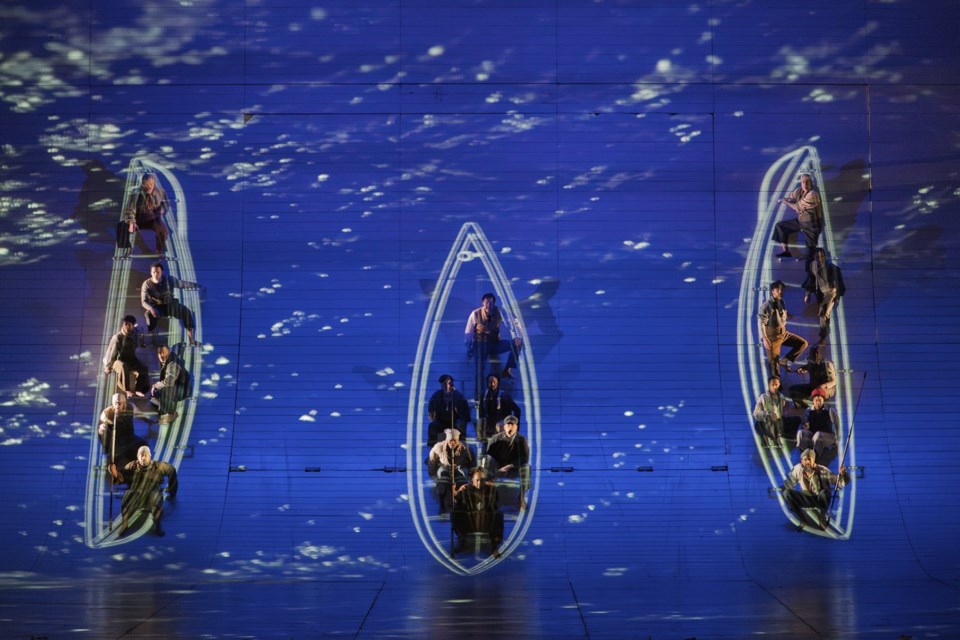When Leonard Foglia was invited to direct based on Herman Melville’s masterpiece about a white whale, his first reaction was: “Moby-Dick. That’s great!”
“Then I ran to a used bookstore and got the book,” he recalled, “and I thought: ‘Oh my God, what am I in for here?’ It’s so daunting. I didn’t panic, but I thought, ‘How do we do this?’”
How he and his collaborators did it will be on display at the beginning March 3. The opera is composed by Jake Heggie to a libretto crafted by Gene Scheer.
To begin with, Scheer had to whittle down to a 64-page libretto. He kept as much of Melville’s language as possible, and estimates that 40% to 50% of his libretto can be found in the original text, though he often tweaked the phrasing to make it more singable.
Heggie and his initial partner, (who withdrew for health reasons), had already decided to lop off the opening chapters, which take place on land. They set the entire opera aboard the whale-hunting ship Pequod.
Another crucial change was renaming the narrator, calling him Greenhorn to reflect his status as a novice aboard the ship. Now the book’s famous opening line, “Call me Ishmael,” is transposed to the very end of the opera when the character has matured.
“In the novel, Ishmael is telling a story that happened many years ago,” Scheer said. “But in the theater, you want to see it happen in real time. … We’re watching him take in all the experiences so that when he says ‘Call me Ishmael,’ he’s ready to write the book. In essence, this opera is the education of Ishmael.”
Tenor Stephen Costello, who is performing the role for the fifth time and is the lone cast holdover from the Dallas premiere in 2010, sees his character as “the only one who really has an arc.
“He goes on the Pequod because there was nothing for him on land,” Costello said. “So he’s either going to die at sea or figure out who he is.”
In addition to Costello, the Met cast includes tenor Brandon Jovanovich as the vengeance-obsessed Captain Ahab. Pip, his cabin boy, is written as a “trousers role” (a male character portrayed by a woman) and will be sung by soprano Janai Brugger. Starbuck, the first mate, will be baritone Peter Mattei, and bass-baritone Ryan Speedo Green will sing the part of Queequeg. Karen Kamensek conducts the eight performances through March 29.
The opera, commissioned to celebrate the opening of a new opera house in Dallas, has been a success from the beginning, drawing praise from audiences and critics — and even scholars.
Bob Wallace, a professor at Northern Kentucky University and past president of the Melville Society, admired the opera so much that he wrote a book about its creation.
“Scheer and Heggie did a brilliant job of shrinking the novel to make it fit the stage and yet preserve so much of the essence of it,” he said in an interview.
As much as critics admired Scheer’s adaptation and Heggie’s tuneful, atmospheric and at times gripping score, they lavished special praise on the physical production, with sets by Robert Brill and projections by Elaine J. McCarthy.
The action, Steve Smith “played out against a multimedia-enriched staging that ranged from striking to near-miraculous.”
Perhaps the most stunning effect is the way animated projections superimposed on a climbing wall that is curved a bit like a skateboard ramp create the illusion of the crew leaving the Pequod to board three whaling boats.
“A lot of the excitement and thrill of watching this is due to the work of the production team,” Scheer said. “Lenny kept saying to me, ’You imagine it the way you want it, and let me figure out how to do it.”
That often involved imposing unusual physical demands on the singers. For instance, when Pip gets lost at sea, his character sings the equivalent of an operatic mad scene dangling high above the stage, with projections making it appear he’s treading water.
“I said to Janai when we first rehearsed it,” Foglia recalled, “OK, you can just get mad at me now, because you have to sing your hardest aria hanging from not even a full harness, just a single wire.”
In addition, Queequeg and Greenhorn climb up and down ladders to sing at the top of the mastheads. Ahab, who has lost a leg in a prior encounter with Moby-Dick, has to hobble on a wooden prosthesis. And Greenhorn — finally named Ishmael — ends the opera grabbing onto a whale hook from a passing ship that lifts him to safety.
“I joke with them that everything opera singers count on in life — having both feet planted on the ground — I’ve taken away from them,” Foglia said.
___
This story was first published Feb. 26, 2025. It was updated on Feb. 28, 2025, to correct the name of Northern Kentucky University.
Mike Silverman, The Associated Press




